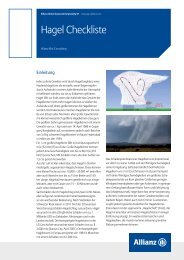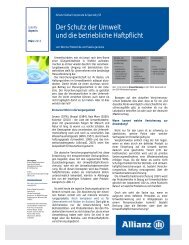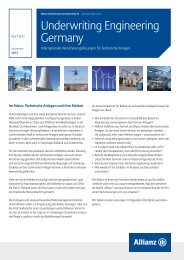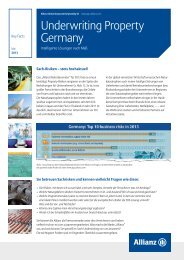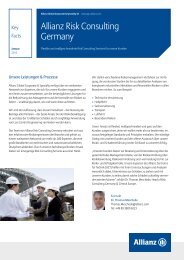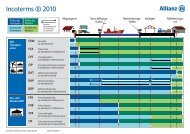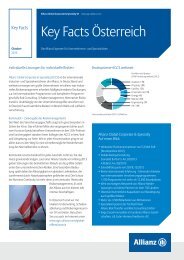News@agcs - Allianz Global Corporate & Specialty
News@agcs - Allianz Global Corporate & Specialty
News@agcs - Allianz Global Corporate & Specialty
You also want an ePaper? Increase the reach of your titles
YUMPU automatically turns print PDFs into web optimized ePapers that Google loves.
Regional Manager Financial<br />
Lines, AGCS, Bill Hassos.<br />
* This option runs a<br />
risk of uncertainty if<br />
something is missed<br />
in the endorsement<br />
drafting. Other issues<br />
may include the<br />
availability of additional<br />
insurer capacity and<br />
that the additional<br />
cover would result in<br />
premium increases.<br />
4<br />
NZ High Court<br />
Adversely affecting D&O policies<br />
A recent ruling by the Auckland Court has caused<br />
uncertainty for directors of companies with regard<br />
to the extent to which they can fund defence costs<br />
through their Directors’ and Officers’ (D&O) liability<br />
insurance cover.<br />
This is concerning not only for New Zealand directors<br />
but also for Australian directors given there is similar<br />
legislation in three states:- s6 LRA 1946 (NSW),s26-28<br />
LRA1956 (NT); and s206-209 CLA 2002 (ACT) .<br />
Regional Manager Financial Lines, AGCS, Bill Hassos said<br />
that “there are a number of ways in which insurers and<br />
insureds can safeguard against any potentially adverse<br />
consequences of the Bridgecorp decision.”<br />
One method is to consider purchasing a separate policy<br />
designed specifically for defence costs. If the traditional<br />
D&O policy is to be maintained directors and their<br />
brokers should consider the following options:<br />
1. Amend the coverage to create separate limits for<br />
damages or compensation claims and another limit for<br />
defence costs.<br />
2. In the event that the D&O policy is purchased with<br />
Entity/Company Securities (‘Side C’) cover, directors<br />
and companies need to decide whether the ‘separate’<br />
defence costs are for the benefit of the directors and<br />
officers only, or in the event of a securities claim against<br />
the company, the company will also have access to such<br />
costs.<br />
3. Include an endorsement, which provides additional<br />
defence costs only, in the event that the blended defence<br />
costs cover is prevented by a statutory charge.*<br />
“Whatever the outcome of the appeal, it is prudent<br />
for Australian and New Zealand directors to review<br />
their policies and talk to their brokers. Changes may be<br />
required to ensure that they are appropriately covered,”<br />
Bill said.<br />
AGCS have two options available for their clients.<br />
A traditional D&O policy with separate limits for<br />
damages or compensation and a separate limit for<br />
Defence costs; and A separate ‘Defence Costs‘ only<br />
Excess Policy.<br />
Clients will also benefit from the expansion of the<br />
Financial Lines Team, with the the appointment of two<br />
new senior positions in Perth.<br />
Neil Bowdrey, Manager, Financial Lines, Western<br />
Australia and Jack Chia, Senior Underwriter, Financial<br />
Lines, Western Australia have joined the AGCS Team<br />
to manage and underwite for Financial Lines clients<br />
in Western Australia. Both roles will report to Regional<br />
Manager, Financial Lines, Bill Hassos.<br />
Case in brief<br />
The case relates to the collapse of the Bridgecorp<br />
companies in 2007, which left some 14,300<br />
investors out of pocket by more than $450 million.<br />
The former company directors were faced with<br />
criminal and civil proceedings and by 2009<br />
directors, having exhausted statuary liability policy<br />
with a limit of NZ$2 million for their defence costs,<br />
sought to access Bridgecorp’s $20 million D&O<br />
policy, with QBE, to fund their defence costs.<br />
The Bridgecorp receivers opposed any attempt<br />
to access any defence funds, claiming that they<br />
intend to bring civil proceedings against the<br />
directors, and that they have first claim over the<br />
insurance monies because of s9 of the Law Reform<br />
Act 1936 (New Zealand). The Auckland High Court<br />
agreed, and ruled that the directors were denied<br />
access.<br />
This means that if a civil claim that exceeds<br />
the policy limit has been, or will be made, then<br />
directors cannot rely on the policy to pay defence<br />
costs even if the civil claim has not yet been filed,<br />
quantified or the chances of success are not clear.<br />
Therefore a charge has effect over ‘all insurance<br />
money’ that is, or may become, payable in respect<br />
of that liability.<br />
While the judgment is under appeal, if upheld, the<br />
decision could potentially affect many Australian<br />
and New Zealand company directors.






